

Established in 1912, the Nuremberg Zoo is one of Germany's most renowned and oldest zoological gardens. Its fascinating history as a part of Nuremberg's cultural landscape has mirrored the changes in society's view of nature conservation and animal welfare. Initially focused on the display of exotic animals for public amusement, it has evolved significantly over the years.
The early 20th century marked the beginning of the zoo's journey when it covered a modest 4 hectares. Despite the devastation of World War II, which led to the destruction of many enclosures, the zoo was promptly rebuilt, symbolizing the resilience of the city of Nuremberg. By the 1950s, it had expanded and became home to a wider variety of species.
From the 1970s onwards, the Nuremberg Zoo began focusing more on conservation and education. It introduced spacious and naturalistic habitats, highlighting the importance of mimicking the natural environments of the animals. The zoo has actively participated in international breeding programs contributing to the conservation of endangered species.
In 1971, the zoo opened a dolphinarium, which over time became both a major attraction and a subject of controversy. It prompted discussions on animal ethics and captivity. Over the years, the debate has led to enhanced protocols for the care of marine mammals at the zoo.
The latest tourism trends see the Nuremberg Zoo offering visitors a more interactive and educational experience. It aims to inspire and inform about biodiversity, conservation, and the ecological roles of different species. The zoo has embraced modern technology, such as augmented reality, to add layers of information to the visitor experience.
Today's visitors enjoy presentations and feeding times, creating educational moments that foster a deeper understanding and appreciation of wildlife. Special events, such as night tours and camping experiences, have been introduced, creating unique opportunities for visitors to connect with nature.
Nuremberg Zoo is continuously developing new ways to engage with its audience while promoting sustainability and conservation. It remains a significant attraction for tourists and a revered institution for the city of Nuremberg.
For travelers seeking a journey through the heart of wildlife conservation and education while relishing the historical charm of one of Germany's treasured zoological gardens, Nuremberg Zoo represents a worthwhile destination.